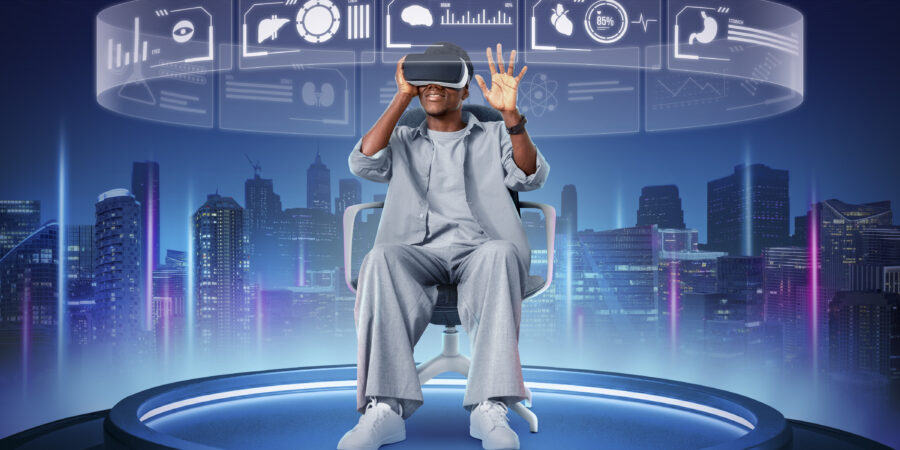Introduction: As we move into 2025, technology continues to evolve at an unprecedented rate. From revolutionary advancements in artificial intelligence (AI) to cutting-edge developments in quantum computing, the future is filled with possibilities. In this blog post, we’ll explore the top 10 breakthrough technologies that are expected to transform industries, enhance daily life, and reshape the world as we know it. These emerging technologies are not just trends—they are game-changers that will drive innovation and influence the global economy in the coming years.
1. Artificial Intelligence (AI) and Machine Learning
AI has already made significant strides, but 2025 promises even greater advancements. Machine learning, a subset of AI, allows systems to learn from data and improve over time. In 2025, AI is set to revolutionize sectors like healthcare, finance, and retail by enabling predictive analytics, enhancing customer experiences, and automating complex tasks.
- Key Areas of Impact:
- Personalized medicine and healthcare.
- Autonomous vehicles.
- AI-powered chatbots and virtual assistants.
2. Quantum Computing
Quantum computing is poised to unlock unimaginable processing power by utilizing quantum bits (qubits) to perform computations at speeds far beyond traditional computers. By 2025, we expect significant breakthroughs that will enable quantum computers to solve problems that are currently impossible for classical computers.
- Key Areas of Impact:
- Drug discovery and molecular modeling.
- Cryptography and cybersecurity.
- Optimization problems in industries like logistics and manufacturing.

3. 5G Connectivity
5G technology is the next generation of mobile internet, offering ultra-fast speeds, low latency, and the ability to connect millions of devices simultaneously. By 2025, 5G will be fully integrated into networks worldwide, providing seamless connectivity and enabling new innovations like the Internet of Things (IoT) and smart cities.
- Key Areas of Impact:
- Real-time communication for remote work and telemedicine.
- Enhanced gaming and augmented reality (AR) experiences.
- IoT-enabled smart devices and automation.
4. Biotechnology and Genetic Engineering
The field of biotechnology is advancing rapidly, with CRISPR gene-editing technology at the forefront of this revolution. By 2025, we can expect groundbreaking advancements in genetic engineering, which will lead to personalized medicine, improved agricultural practices, and the potential to cure genetic disorders.
- Key Areas of Impact:
- Precision medicine and gene therapies.
- Sustainable agriculture with genetically modified crops.
- Advancements in organ transplantation and regeneration.
5. Autonomous Vehicles
Autonomous or self-driving vehicles are becoming a reality. By 2025, we will see a significant increase in the deployment of self-driving cars, trucks, and drones, transforming transportation and logistics. These vehicles rely on AI, sensors, and data analytics to navigate and make decisions independently.
- Key Areas of Impact:
- Improved road safety and reduced traffic congestion.
- Transformation of supply chains and last-mile delivery.
- Reduction in carbon emissions and energy consumption.

6. Blockchain Technology
Blockchain, the decentralized ledger system behind cryptocurrencies like Bitcoin, is expanding beyond finance. By 2025, blockchain will have a profound impact on industries such as supply chain management, healthcare, and voting systems due to its transparency, security, and immutability.
- Key Areas of Impact:
- Secure and transparent supply chain tracking.
- Streamlined financial transactions and reduced fraud.
- Decentralized voting systems for improved democracy.
7. Augmented Reality (AR) and Virtual Reality (VR)
AR and VR technologies are transforming how we interact with digital content. By 2025, these immersive technologies will enhance industries like gaming, education, retail, and real estate. AR and VR will offer more interactive and realistic experiences, blurring the lines between the physical and digital worlds.
- Key Areas of Impact:
- Virtual training and simulation for various industries.
- Enhanced e-commerce experiences with virtual try-ons.
- Virtual travel and remote experiences for consumers.
8. Clean Energy Technologies
As the world faces the growing challenge of climate change, clean energy technologies are taking center stage. In 2025, advancements in solar, wind, and battery storage systems will make renewable energy more affordable and efficient, paving the way for a sustainable future.
- Key Areas of Impact:
- Expansion of solar and wind energy installations.
- Development of next-generation batteries for energy storage.
- Electric vehicles (EVs) and sustainable transportation.

9. Robotics and Automation
Robots are no longer just confined to manufacturing. By 2025, robots will be widely integrated into various industries, including healthcare, logistics, and home services. Robotic process automation (RPA) is also set to revolutionize business operations by automating repetitive tasks.
- Key Areas of Impact:
- Healthcare robots assisting in surgeries and elderly care.
- Industrial robots enhancing manufacturing processes.
- Robotic delivery systems for e-commerce and food services.
10. Space Exploration and Commercialization
Space exploration has made significant advancements, and by 2025, we can expect commercial space travel and even more ambitious projects like lunar bases and Mars missions. Private companies are leading the charge in commercial space ventures, making space more accessible to private citizens and businesses.
- Key Areas of Impact:
- Commercial space tourism for civilians.
- Mining resources from asteroids and the Moon.
- Space-based infrastructure and communications.
Conclusion:
The next few years promise to be an exciting time for technology, as these breakthrough innovations reshape industries and everyday life. From AI and quantum computing to clean energy and space exploration, the technologies of 2025 will have a profound impact on how we live, work, and interact with the world. As we embrace these advancements, it’s important to stay informed about the latest trends and how they can be leveraged to drive positive change.





Leave a Reply